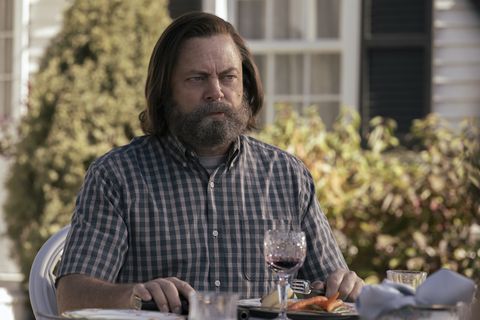The love story in episode 3 of The Last of Us, like a survivalist’s booby-trapped house, hides a few surprises. When we move away from Joel and Ellie’s quest through a bombed Boston, it feels like it might just be for a moment; the show has excelled at crafting memorable, pre-outbreak day flashbacks. Instead, the sequence takes up over 40 minutes of the episode. You might also expect too, in this adaptation of a videogame, that the love story would be blandly told: such adaptations do not have a history of bringing the nuances of human relationships to life. And yet, here is something well-acted and solidly-told. Finally, most importantly, it is a romance between two men, Bill (Nick Offerman) and Frank (Murray Bartlett).
Bill, who avoided execution after break-out day, has created a well-guarded, well-stocked house, complete with a fruit and vegetable patch. His traps keep the stray infected out. He is safe, protected, alone. Until he meets Frank, for whom he cooks and quickly falls for. The full timeline of their love story certainly has some emotional highlights, and their dinnertime death scene is shot through with some memorable black humour. It also significantly expands on the source material; in the videogame, the relationship is an aside. Bill makes vague reference to a partner, decries love as something that makes you vulnerable. The adaptation’s decision to expand on this storyline makes sense. There are not many humans in this devastated landscape; the ones that have personalities beyond smuggler or soldier must be tempting to writers.
It’s also good casting. Offerman, loveably gruff, is best known for his role as whiskey-loving, animal-hunting libertarian Ron Swanson on Parks and Recreation. Some of those values – a suspicious, outdoorsy nature – are shared with Bill, but you might not expect him to lead such a romance-heavy sequence. Bartlett, an openly gay actor whose most famous roles have been as gay characters in The White Lotus, Welcome to Chippendales and Looking, is a well-chosen scene partner. There’s a good chance Bartlett will be playing a gay character: the idea that Offerman’s character might be too blossoms as delicately as the pair’s relationship.
There are plenty of reasons why the sequence felt fresh, not least because this series has so far played out like a very familiar adventure quest. But the most obvious is that LGBT representation in videogames, and by extension their adaptations, has not been historically rich. It as dreary as you might expect. One queer gamer estimated that only 179 commercially-released games had queer characters; only eight had a main character was “pre-written as queer”, that is opposed to making them queer as an option. That was in 2018. Since then, more video games have featured queer characters, including The Last of Us Part II. As these games have been adapted for the screen, there has not exactly been a wealth of gay characters to choose from.
That makes Bill’s barely-mentioned relationship in The Last of Us something of an outlier. The gaming franchise continued to branch out with its 2020 sequel, The Last of Us Part II, in which Ellie’s relationship with girlfriend Dina took centre stage. That follow-up was met with review bombing on critical aggregator site Metacritic, at least some of which was directed at its LGBT characters (a transgender character was also introduced). That’s not exactly heartening, but the world of TV and videogames are not the same. Gay storylines on TV, while not ubiquitous, are not unheard of. Bill and Frank’s relationship does have a sense of artificial seriousness, a very clear way of The Last of Us to signal that it is not like the other videogame adaptations. So far, that has been one of the show’s dominant qualities. As it continues, it may need to demonstrate some more original features to maintain its (quite staggering) audience.
But perhaps it’s the reception of the storyline which will prove most interesting. Already, the reaction from social media, on par with the show’s entire run, has been rapturous: calls for Offerman to win an Emmy, declarations of tears. Reviews have called it, not without reason, the best episode of the season. In that respect, it’s already broken ground.
‘The Last of Us’ airs weekly on Sky Atlantic and NOW TV









